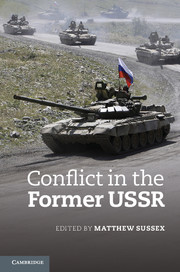Book contents
- Frontmatter
- Contents
- Maps
- Contributors
- Acknowledgements
- Abbreviations
- Map
- 1 Introduction
- 2 The return of imperial Russia
- 3 The shape of the security order in the former USSR
- 4 Great powers and small wars in the Caucasus
- 5 The Russo-Georgian war
- 6 Why not more conflict in the former USSR?
- 7 Transnational crime, corruption and conflict in Russia and the former USSR
- 8 The transformation of war?
- 9 Conclusions
- Bibliography
- Index
- References
1 - Introduction
Understanding conflict in the former USSR
Published online by Cambridge University Press: 05 November 2012
- Frontmatter
- Contents
- Maps
- Contributors
- Acknowledgements
- Abbreviations
- Map
- 1 Introduction
- 2 The return of imperial Russia
- 3 The shape of the security order in the former USSR
- 4 Great powers and small wars in the Caucasus
- 5 The Russo-Georgian war
- 6 Why not more conflict in the former USSR?
- 7 Transnational crime, corruption and conflict in Russia and the former USSR
- 8 The transformation of war?
- 9 Conclusions
- Bibliography
- Index
- References
Summary
This book evaluates the nature, causes and implications of conflicts in the geographical space formerly occupied by the USSR. It does so in the context of current debates in the international relations literature regarding the role of power, interests, technological forces, and normative issues as major drivers of contemporary political violence. Since the end of the Cold War, Russia has attempted to maintain a sphere of influence on what was once the territory of the Union of Soviet Socialist Republics (USSR). Whether in the 2008 Russo-Georgian conflict; the wars in Chechnya; struggles over resources with Ukraine; disputes in Central Asia over ethnicity; or in latent conflicts that are aided by terrorism and corruption, the former Soviet space remains an under-evaluated area in the literature on contemporary conflict. With new issues such as energy security and transnational crime gaining in saliency, and older tensions between East and West deepening once more, it is vital that security specialists pay closer attention to this region of the world.
Following the end of the Cold War many specialists on conflict – mistakenly, we argue – shifted their attention away from Russia as a primary area for analysis. At the turn of the twenty-first century George W. Bush suggested upon coming to power that the People’s Republic of China (PRC) and Russia would be major focal points of the new Republican Administration’s foreign policy. Yet the strategic shock of 9/11 had the immediate impact of redirecting US attention to the ‘war on terror’, with an increasing focus on the Middle East and the Persian Gulf. Many in the field of international relations also then turned their attention to issues of global terrorism and the threat of rogue or failing states gaining weapons of mass destruction (WMD). Insofar as the former republics of the USSR figured in these new security concerns, it was in relation to their position in the wider war on terror; oil and gas resources in the Caspian region; pipeline routes; and as potential allies who could facilitate access to bases in Eurasia.
- Type
- Chapter
- Information
- Conflict in the Former USSR , pp. 1 - 14Publisher: Cambridge University PressPrint publication year: 2012
References
- 1
- Cited by



